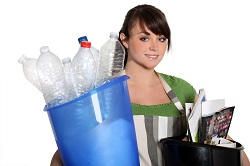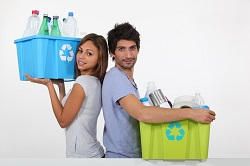Discovering Recycling: A Journey for Kids
Posted on 06/09/2025
Discovering Recycling: A Journey for Kids
Introduction to Recycling for Kids
Recycling, a word we've all heard, is more than just tossing an empty bottle into a blue bin. For children, recycling is an exciting adventure that helps them understand how to keep our planet healthy! Embarking on this journey, kids can learn about waste management, environmental stewardship, and the importance of sustainability.
But what exactly does recycling mean? Why is it so crucial, and how can kids get involved? Let's dive into the fascinating world of recycling for kids--exploring how everyday actions can make a world of difference!

What Is Recycling? Understanding the Basics
At its core, recycling is the process of taking materials that have been used and turning them into something new. This simple act helps to:
- Reduce the amount of waste sent to landfills
- Conserve valuable natural resources
- Save energy
- Prevent pollution
For kids, understanding recycling starts with recognizing the types of materials that can be recycled, such as:
- Paper (newspapers, cardboard, magazines)
- Plastic (bottles, containers, bags)
- Glass (bottles, jars)
- Metal (aluminum cans, tin cans)
Discovering recycling means learning how these items go from your home to recycling centers and then into new products that we use every day.
The Journey of a Recyclable: From Bin to New Life
When you toss a recyclable item into the correct bin, you're sending it on an incredible journey. Here's what usually happens next:
- Collection: The municipality collects recyclable items from homes, schools, and public places.
- Sorting: At the recycling facility, items are sorted into different types (like paper, plastic, and glass).
- Processing: Sorted items are cleaned and broken down into raw materials.
- Manufacturing: These materials are shaped into new products--such as recycled paper, new cans, or plastic containers.
- Reuse: The new products are sold back to stores and used by people around the world!
Understanding this cycle helps kids appreciate how recycling helps save the planet and reduces waste.
Why Is Recycling Important for Kids?
Recycling isn't just for adults. Kids play a vital role in protecting the environment. Here's why discovering recycling should be part of every child's education:
- Makes a Difference: Each item recycled means less waste in landfills and less pollution.
- Builds Habits: Learning to recycle early helps children develop lifelong eco-friendly habits.
- Supports Wildlife: Keeping waste out of the environment protects animals and their habitats.
- Saves Resources: Recycling conserves resources like water, trees, and minerals for future generations.
When kids recycle, they become environmental superheroes--helping to make our world cleaner and greener!
Fun Recycling Activities for Kids
Turning recycling into an engaging activity can make the whole concept even more enjoyable. Here are some fun recycling projects and ideas for kids:
Create a Home Recycling Station
Set up bins for paper, plastic, glass, and metal. Label each bin with pictures and words. Teach children to sort household waste correctly, turning sorting into a daily game or challenge.
DIY Crafts with Recyclables
- Plastic Bottle Planters: Cut empty bottles in half, decorate them, and use them to grow small plants.
- Cardboard Robots: Stack boxes and tubes to create colorful robots or animals.
- Egg Carton Art: Turn egg cartons into caterpillars, flowers, or other creative critters.
Recycling Scavenger Hunt
Make a list of recyclable items and have a scavenger hunt around the house or school. Whoever collects the most items wins a small eco-friendly prize!
Visit a Local Recycling Center
If possible, arrange a trip to a recycling facility. Kids can see firsthand how their recyclables are processed and learn how the recycling journey continues beyond the bin.
How to Teach Kids About Recycling
Teaching kids about recycling is a blend of education and hands-on experience. Use these tips to foster eco-awareness:
- Start Simple: Begin by teaching the basics--what can and cannot be recycled.
- Lead by Example: Kids often imitate adults, so always practice good recycling habits at home.
- Use Storytelling: Share stories about how recycling helps animals, communities, and the earth.
- Display Visuals: Put up posters or charts near recycling bins as reminders.
- Offer Praise: Celebrate successes by recognizing when kids remember to recycle correctly.
Discovering recycling together can create lasting memories and positive habits.
Understanding Symbols and Signs
As children advance in their recycling journey, it's helpful to recognize common recycling symbols. The most famous is the Mobius loop--three arrows chasing each other in a triangle, indicating that a material is recyclable.
- Plastic Codes: Look for numbers inside the triangle; these tell you what type of plastic it is.
- Curbside Recyclable: This sign means the item can be placed in household recycling bins.
- Recycled Content: Indicates that the product was made from recycled materials.
Teaching kids to spot these symbols encourages them to make smart recycling choices.
Recycling Challenges and How to Overcome Them
Sometimes, recycling can be a bit tricky. For example:
- Not all plastics are recyclable in every area.
- Items with food residue (like greasy pizza boxes) often cannot be recycled.
- Certain materials, like electronics, require special recycling methods.
Tips for Overcoming Recycling Challenges:
- Check Local Rules: Always read your community's recycling guidelines.
- Clean Items: Make sure recyclables are free from food and liquids.
- Separate Materials: If a package combines different materials (like plastic and metal), separate them before recycling.
- Research: Learn where to recycle special items like batteries and electronics.
With a little effort and education, children can become recycling experts!
Recycling Around the World
Did you know that recycling practices vary in different countries? Here are some interesting facts:
- Sweden: Less than 1% of waste goes to landfills because of their advanced recycling and waste-to-energy systems!
- Japan: Communities often separate waste into more than ten different categories for recycling.
- Australia: Kids make a big difference by participating in "Container Deposit Schemes"--returning bottles and cans for money.
Exploring how other kids around the world are involved in discovering recycling can inspire children to do even more at home.
The Three R's: Reduce, Reuse, Recycle
While recycling is vital, reducing and reusing are just as important. These three R's can guide kids toward living a truly sustainable lifestyle:
- Reduce: Use less in the first place. For example, choose reusable water bottles and lunch containers.
- Reuse: Find new uses for old items--like turning jars into storage containers.
- Recycle: Recycle what you can, giving materials a second life.
Ask your kids: "How can we reduce waste at home, reuse what we have, and recycle the rest?"
Frequently Asked Questions About Recycling for Kids
What should kids not put in the recycling bin?
Items like plastic bags, greasy food containers, and electronics should never go in regular recycling bins. Always check local rules or ask an adult if unsure.
Can kids recycle at school?
Absolutely! Most schools have recycling programs. Encourage your school to set up more bins or arrange recycling challenges for students.
Why do some items need to be cleaned before recycling?
Food residue can contaminate recyclable materials, making them harder to process or causing them to be thrown away. Clean items help make recycling more effective!

Conclusion: Becoming a Recycling Hero
Discovering recycling is more than just sorting trash--it's a fun and impactful journey that empowers kids to care for the planet. Through learning, activities, and everyday actions, children can be the change-makers the world needs.
Remember:
- Every recycled item counts!
- Start simple, and grow your knowledge.
- Challenge yourself and your friends--who can recycle the most?
- Be creative! Turn recycling into art and science adventures.
Together, kids and families can build a greener, cleaner, and more sustainable world--one piece of recycling at a time!
Additional Resources: Where Can Kids Learn More About Recycling?
- National Geographic Kids: Fun facts and videos about recycling and the environment.
- Recycle Now (UK): Interactive games and advice for young recyclers.
- Earth Rangers: Adventures, activities, and challenges for kids who want to protect the planet.
- Your Local Library: Books and resources about recycling for young readers.
So, what are you waiting for? Grab a recycling bin and start your journey to becoming a recycling hero today!
Latest Posts
Cardboard: Transforming Disposal into Opportunity
Revitalize Your Home: Comprehensive Clutter Removal Techniques
Waste Management Simplified: The Builders Skip Explained

 020 3875 4096
020 3875 4096 020 3875 4096
020 3875 4096




 House clearance
House clearance Rubbish collection
Rubbish collection London Rubbish Clearance is one of the most popular companies for
London Rubbish Clearance is one of the most popular companies for  Our company in London is all you need for professional rubbish collection! London Rubbish Clearance has lots of experience when it...
Our company in London is all you need for professional rubbish collection! London Rubbish Clearance has lots of experience when it...





